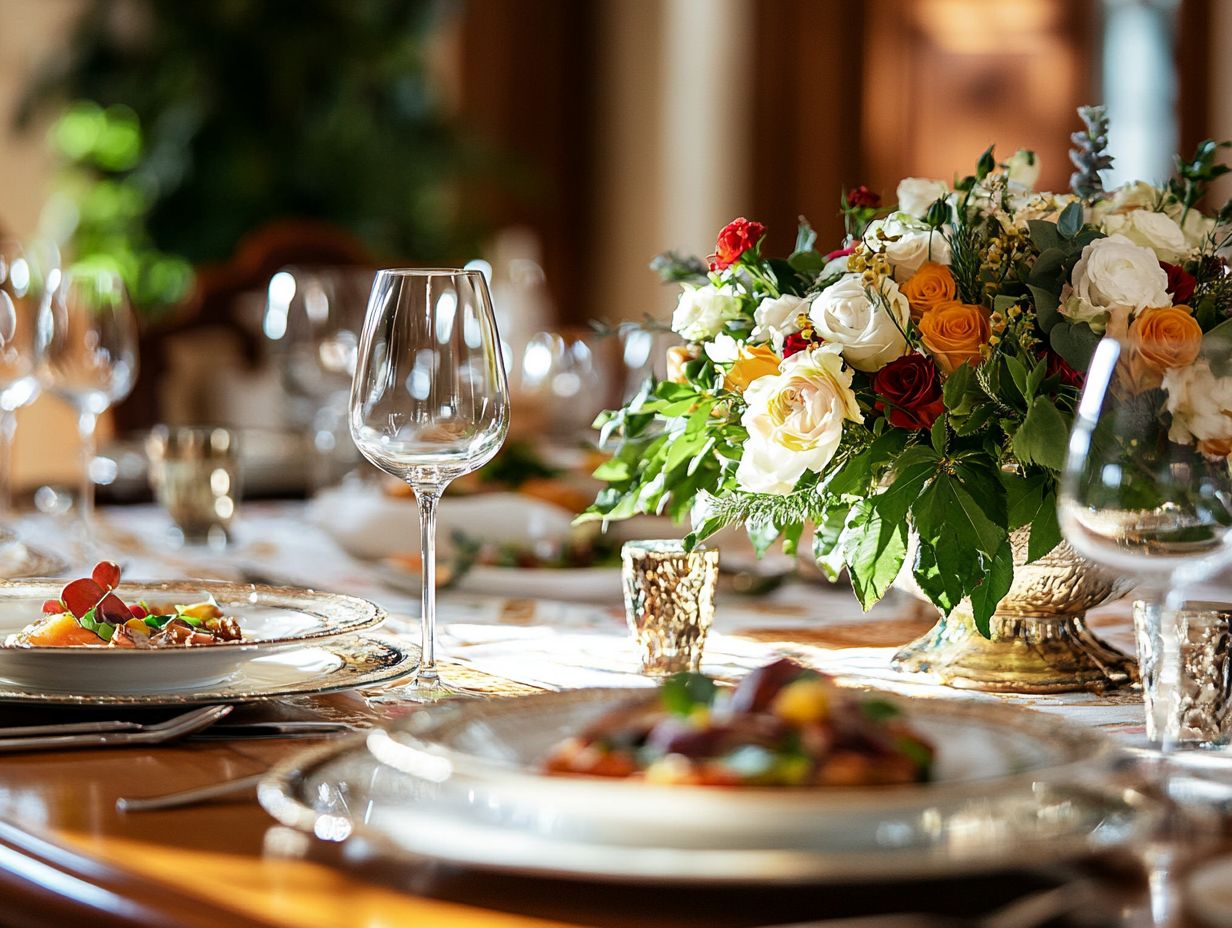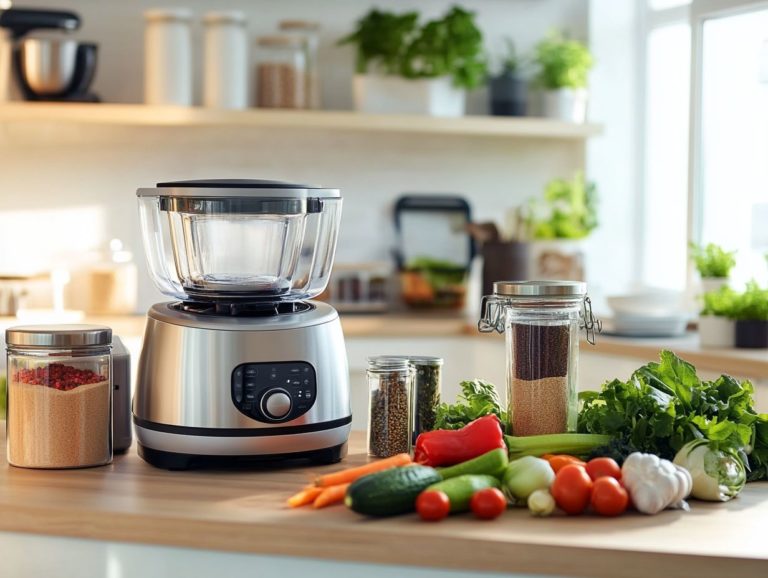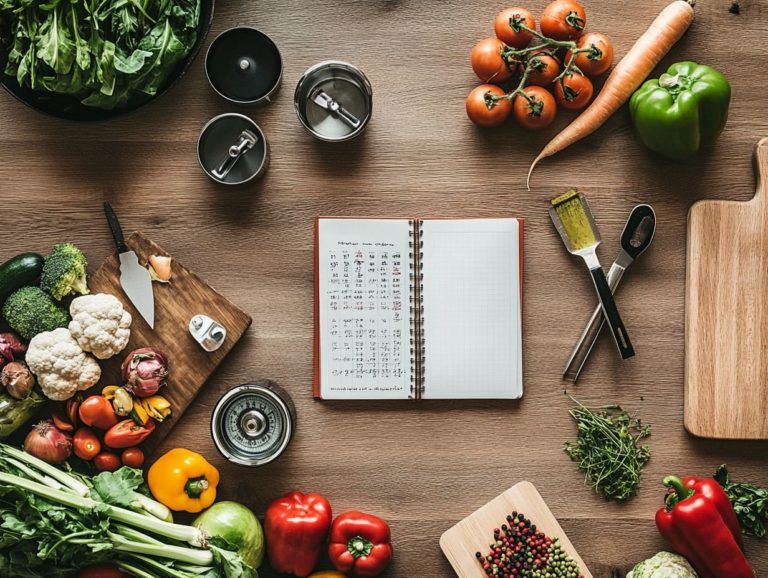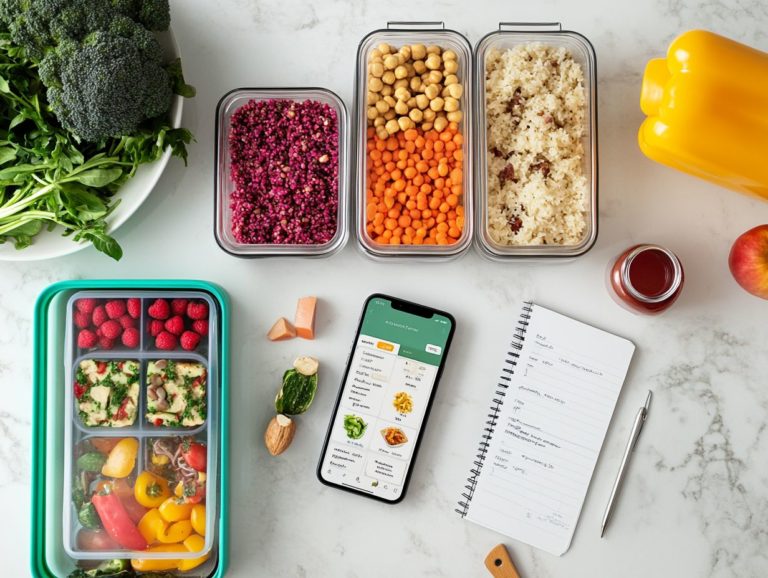How to Meal Plan for Special Occasions
Planning a meal for a special occasion can be both thrilling and somewhat overwhelming. Whether you’re hosting a holiday gathering, a birthday celebration, or a family reunion, thoughtful meal planning is essential for a seamless experience.
Take into account crucial factors like dietary restrictions and budget constraints as you craft a delightful menu. You ll find practical tips for efficient grocery shopping and managing last-minute changes, ensuring your event shines from start to finish.
Explore how proper meal planning can truly elevate your special occasions!
Contents
- Key Takeaways:
- Why Meal Planning is Important for Special Occasions
- Factors to Consider for Meal Planning
- Creating a Menu for Special Occasions
- Tips for Efficient Grocery Shopping
- Preparing and Cooking for Special Occasions
- Dealing with Last Minute Changes
- Frequently Asked Questions
- What is the importance of meal planning for special occasions?
- How far in advance should I start meal planning for a special occasion?
- How do I create a menu for a special occasion?
- How can I save money while meal planning for a special occasion?
- What are some tips for organizing and preparing for a special occasion meal?
- What should I do with leftover ingredients after a special occasion meal?
Key Takeaways:
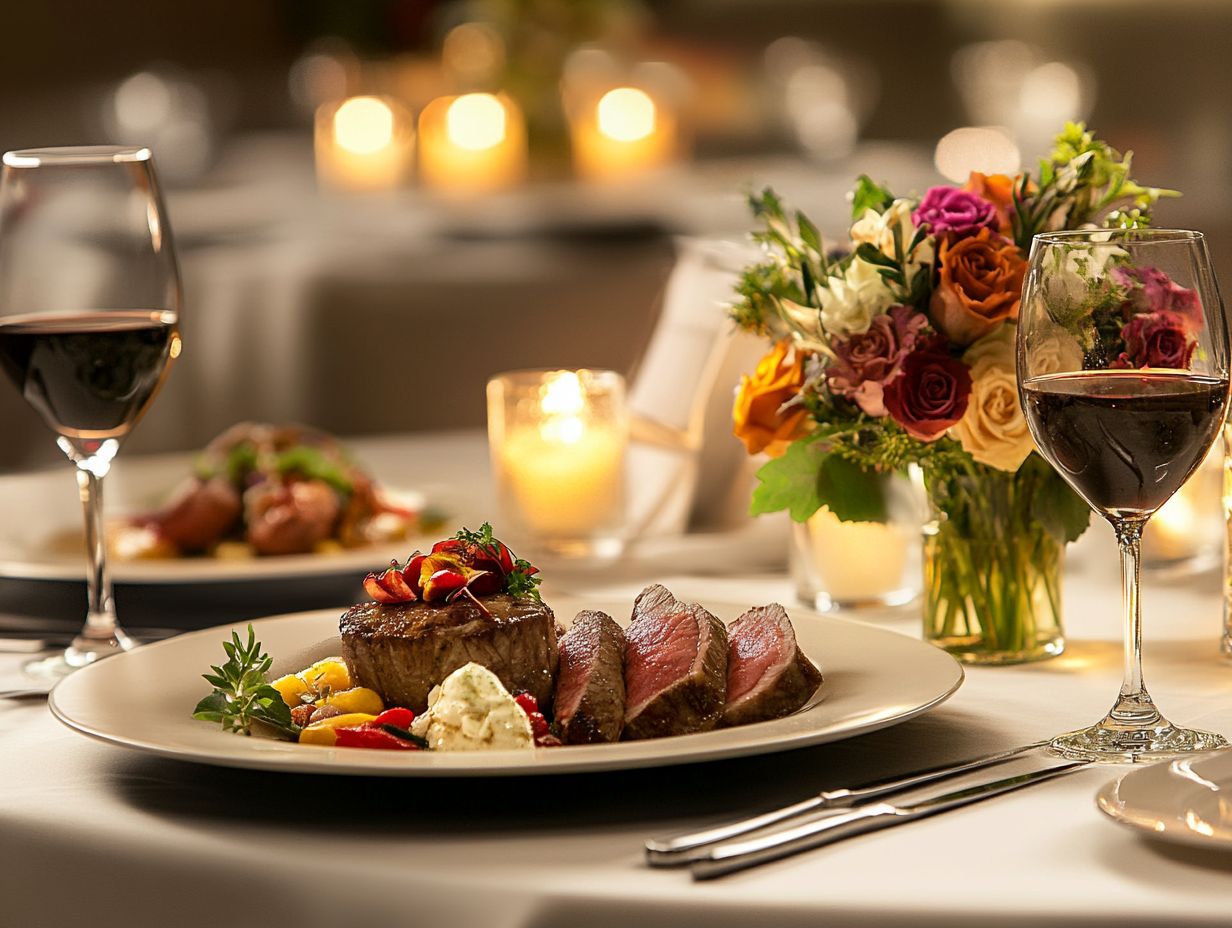
- Consider dietary restrictions and preferences when meal planning for special occasions to ensure everyone can enjoy the meal.
- Create a menu with a variety of dishes and balance flavors and nutrition to cater to different tastes.
- Efficient grocery shopping, including making a list and shopping in advance, can save time and money when meal planning.
Why Meal Planning is Important for Special Occasions
Meal planning for special occasions is vital. It ensures every food detail is expertly curated, delivering an unforgettable dining experience for your guests. This planning allows you to organize dishes that beautifully reflect the theme of your event, whether it’s an elegant dinner party or a lively festive gathering. For those considering dietary restrictions, knowing how to plan meals for a gluten-free diet can be particularly beneficial.
By planning ahead, you can incorporate essential recipes while also considering dietary restrictions. With the right recipes, you’re all set to impress your guests!
Effective meal planning enhances the overall experience by creating a seamless flow between courses, elevating the atmosphere of your gathering. A well-structured meal plan accommodates various preferences, ensuring that vegetarian options, such as stuffed bell peppers, and gluten-free desserts like flourless chocolate cake are readily available for those with specific dietary needs.
This meticulous attention to detail promotes inclusivity and shows your guests that you genuinely care, making them feel valued. Ultimately, a thoughtfully crafted menu can elevate an ordinary gathering into a memorable feast, leaving a lasting impression on everyone in attendance.
Factors to Consider for Meal Planning
When you embark on meal planning for special occasions, it’s essential to consider a variety of factors to create a seamless and enjoyable experience for both you and your guests. By understanding dietary restrictions and preferences, you can select dishes that accommodate everyone, using tips on how to meal plan for a healthy lifestyle.
Additionally, keeping budget and time constraints in mind will help you ensure that the event stays within financial limits and is executed with efficiency.
Dietary Restrictions and Preferences
Accommodating dietary restrictions and preferences is essential to ensuring that all your guests feel included and satisfied. You can offer a range of special occasion dishes tailored to diverse dietary needs, from delightful vegetarian options like backyard vegetable paella to gluten-free desserts, such as key lime pie.
For your gluten-intolerant guests, traditional Mexican dishes can be effortlessly adapted. For example, consider using corn tortillas for enchiladas instead of flour; it provides a delicious and safe alternative that everyone can enjoy.
Managing allergies can also be a breeze by substituting ingredients in classic desserts like cr me br l e. Using coconut cream instead of heavy cream caters to both dairy-free and vegan preferences while preserving that rich, custardy texture everyone loves.
By offering a variety of choices, you ensure that everyone can revel in the festivities without feeling restricted. Start planning your unforgettable meal today and create memories that last a lifetime!
Budget and Time Constraints
Budget and time constraints play a significant role in your meal planning, especially for special occasions when the pressure to create an impressive spread is at its highest. Establishing a realistic budget early on is essential; it will guide your selection of must-know recipes and help you avoid the temptation to overspend on extravagant ingredients that may not align with your overall meal theme.
One effective strategy for managing costs is to focus on bulk purchasing. This enables you to stock up on essentials and save money over time. Selecting seasonal ingredients not only enhances flavor but also ensures freshness for dishes like grilled lobster and roast lamb without straining your budget.
In terms of time management, prepping ingredients in advance can significantly alleviate stress on the event day. Chopping vegetables or marinating proteins ahead of time allows you the luxury of a relaxed cooking experience. Embracing slow-cooked recipes adds an extra layer of flexibility, as these dishes can simmer away, developing rich flavors without demanding constant attention. This frees up precious time for your hosting duties.
Creating a Menu for Special Occasions

Crafting a menu for special occasions is an exciting challenge. You need to select dishes that not only tantalize the taste buds but also align perfectly with the event’s theme.
Whether you’re hosting an elegant dinner party or planning a festive family meal for the holidays, your menu should embody a harmonious blend of great dishes that highlight your culinary talents. Drawing upon insights from a cooking expert can elevate your selections, ensuring that each dish becomes a genuine crowd-pleaser.
Choosing Dishes and Recipes
Choosing the right dishes and recipes for your special occasion is essential for crafting an unforgettable dining experience that truly reflects the theme and the preferences of your guests.
To achieve this, you must consider the delicate balance of flavors and textures, while also keeping dietary restrictions and individual preferences in mind. A successful menu could feature crowd-pleasers like slow-cooked pork, known for its melt-in-your-mouth tenderness, or grilled lobster, celebrated for its succulent taste and stunning presentation. Oxtail, a flavorful, slow-cooked meat from a cow s tail, develops a rich depth of flavor that can elevate any dining affair.
When presenting these dishes, think about using exquisite serving platters and thoughtful garnishes that showcase the vibrant colors and textures of the food. This way, each plate becomes not just a meal but a visual feast that delights the senses.
Incorporating Variety and Balance
Incorporating variety and balance into your menu is crucial for crafting a well-rounded meal that delights every guest at your special occasion. You can achieve this by presenting a diverse selection of flavors, textures, and dietary options.
Each course from delectable appetizers like whipped ricotta to indulgent desserts such as key lime pie should contribute to an overall balanced experience. By thoughtfully curating dishes that cater to different tastes, you can create a harmonious dining experience that captivates everyone at the table.
Consider pairing hearty options like roasted vegetable lasagna with lighter fare such as a zesty quinoa salad. This strikes a balance that respects diverse preferences. Complementary sides, like garlic saut ed greens or a rich balsamic reduction, can enhance your main courses and encourage guests to explore various flavors.
Offering gluten-free or vegan dishes ensures you accommodate a range of dietary restrictions, making sure that no one feels left out. This careful attention to variety and balance transforms your meal into a delightful culinary journey, leaving a lasting impression on each guest.
Tips for Efficient Grocery Shopping
Efficient grocery shopping is essential for successful meal planning during special occasions. It allows you to streamline your preparations and significantly reduce stress.
Make a detailed shopping list that matches your menu and acquire ingredients ahead of time. You ll enjoy a smoother cooking experience and have the luxury of time to fully savor the celebrations.
Making a List and Sticking to It
Creating a well-structured grocery list is a smart idea that can save you both time and money when shopping for special occasions. By categorizing items based on your meal plan, you ensure that all necessary ingredients are accounted for, minimizing impulse purchases and streamlining your shopping experience.
Organizing your list into food groups like vegetables, proteins, grains, and dairy makes navigating the store much simpler. Before you head out, take a moment to review the list carefully, checking for any overlooked items or adjustments needed based on availability.
Focus is key while shopping. Leave your phone behind or silence notifications to avoid distractions. This focused approach not only makes your shopping trip faster but also helps you stick to your budget, as it reduces the temptation to wander the aisles aimlessly.
Shopping for Ingredients in Advance
Shopping for your ingredients in advance is a smart idea that can significantly enhance your time management and efficiency when preparing for special occasions. Don’t wait until the last minute! By procuring long-lasting items and some fresh produce a few days before the event, you can alleviate that last-minute scramble and devote your attention to crafting those intricate French dishes that truly impress.
Stocking up on pantry staples such as dried herbs, grains, and canned tomatoes gives you the flexibility to whip up meals on a whim. Purchasing fresh produce, like root vegetables and onions, a week ahead establishes a flavor base that elevates various dishes. To keep these ingredients fresh, proper storage is vital; for instance, storing root vegetables in a cool, dark, dry place will extend their lifespan.
Consider crafting a shopping timeline for yourself:
- Shop for long-lasting items a week in advance.
- Purchase fresh produce just a few days before you start cooking.
This method not only maximizes your time but also optimizes the quality of your ingredients, setting you up for culinary success.
Preparing and Cooking for Special Occasions
Preparing and cooking for special occasions is not just a duty; it’s a chance to create unforgettable memories! It demands careful planning and good organization, ensuring that everything unfolds seamlessly on the big day.
Mastering effective time management and maintaining a well-organized kitchen are essential elements. This approach allows you to serve exquisite dishes, such as slow-cooked pork or grilled lobster, all while keeping the stress at bay.
Time Management and Kitchen Organization
Time management and kitchen organization are pivotal elements that can elevate or undermine your cooking experience for special occasions. By implementing a structured approach to meal planning, you can effectively allocate time for each task while ensuring your kitchen remains orderly.
This allows you to concentrate on transforming fresh ingredients into extraordinary dishes that will impress.
To streamline this process, consider pre-chopping vegetables or marinating meats a day ahead. This simple step frees up precious time on the actual day of cooking. Creating a designated space for all your ingredients and tools using trays and containers can also enhance efficiency and minimize stress.
Adopting the habit of cleaning as you go not only keeps your countertops clutter-free but also fosters a more enjoyable cooking experience. Ultimately, these practices lead to a seamless and delightful preparation process for those memorable events you re hosting.
Dealing with Last Minute Changes
Last-minute changes happen when hosting. Having a well-crafted strategy makes it easier. Navigating unexpected guest arrivals or specific dietary needs can be managed with ease.
Embracing flexibility and adaptability in your meal planning enhances the overall enjoyment for everyone present. This approach also opens the door for creative adjustments to your carefully planned menu, ensuring that each gathering is memorable and delightful.
Flexibility and Adaptability in Meal Planning
Flexibility and adaptability in your meal planning are crucial for navigating the unpredictable nature of special occasions. This means you should be open to modifying your menu, whether that involves swapping out a planned dish for something more feasible or adjusting serving sizes based on unexpected guest numbers.
To achieve this, consider creating a versatile menu featuring dishes that allow for quick substitutions or additions. For instance, a pasta dish can easily transition from a creamy Alfredo to a robust marinara simply by switching the sauce. This caters to diverse palates with minimal effort.
Offering a salad bar enables your guests to customize their greens, toppings, and dressings. This way, everyone finds something to their liking while maintaining the essence of the meal. Incorporating a variety of proteins, such as grilled chicken, roasted vegetables, or plant-based options, enhances the dining experience and accommodates dietary restrictions without sacrificing that celebratory vibe.
Frequently Asked Questions
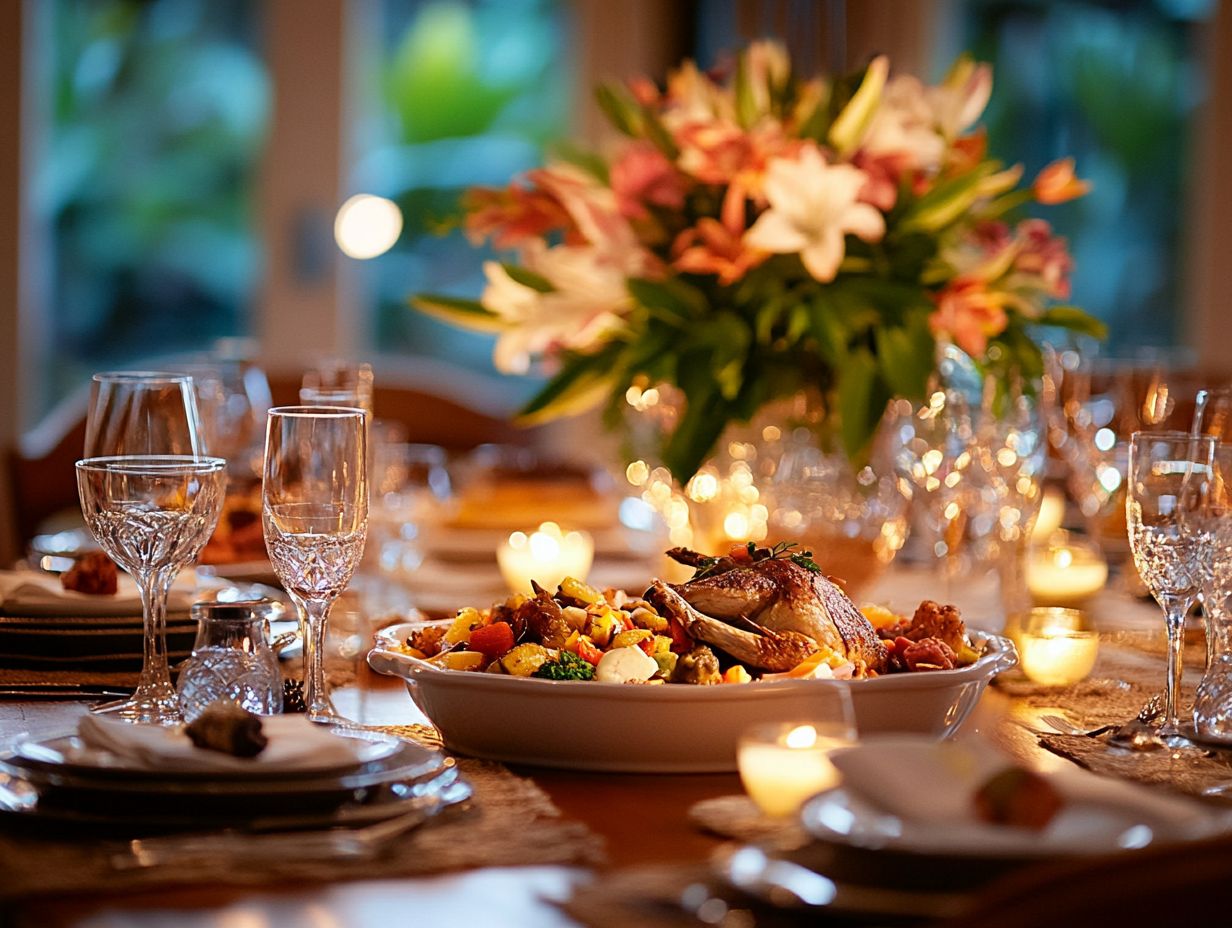
What is the importance of meal planning for special occasions?
Meal planning is your secret weapon to save time, money, and stress during special occasions! It ensures that you have all the necessary ingredients and allows for a more organized and enjoyable celebration.
How far in advance should I start meal planning for a special occasion?
It is recommended to start meal planning at least 2 weeks in advance for a special occasion. This allows enough time to create a menu, gather ingredients, and make any necessary adjustments.
To create a menu for a special occasion, consider the theme or type of event, the number of guests, and any dietary restrictions. Plan for a variety of dishes and include a mix of appetizers, main courses, and desserts.
How can I save money while meal planning for a special occasion?
To save money, consider using seasonal ingredients, buying in bulk, and making dishes from scratch. You can also opt for budget-friendly options like potluck-style meals or having guests bring a dish to share.
What are some tips for organizing and preparing for a special occasion meal?
Some tips for organizing and preparing for a special occasion meal include making a detailed grocery list, preparing dishes in advance, and delegating tasks to others. It s also important to have a clean, well-organized kitchen and to use time-saving techniques like a slow cooker or instant pot.
What should I do with leftover ingredients after a special occasion meal?
Leftover ingredients can be used for meal planning in the future. You can freeze them for later use or repurpose them into new dishes. Donating any excess food to a local food bank or shelter is a great way to reduce waste and give back to the community.
Ready to elevate your next gathering? Let s get started with your meal planning!

